七年级英语下册 第十一单元学案 新目标
- 格式:doc
- 大小:107.50 KB
- 文档页数:7
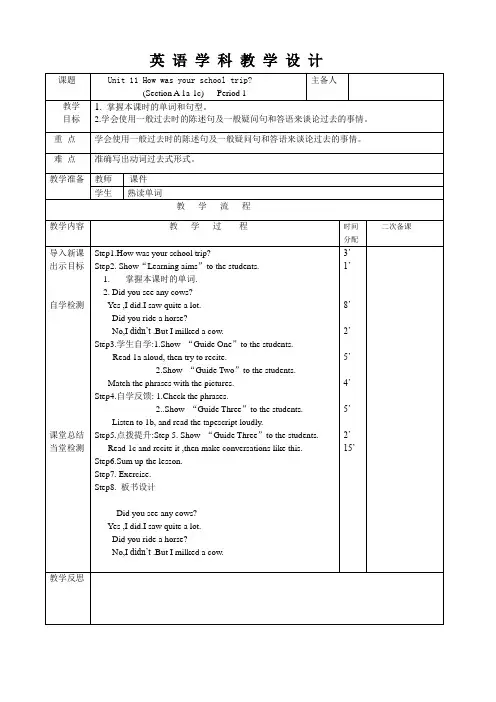
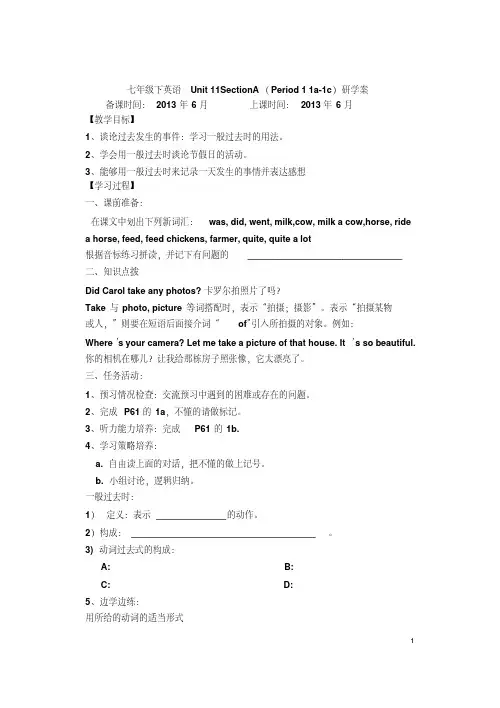
七年级下英语Unit 11SectionA(Period 1 1a-1c)研学案备课时间:2013年6月上课时间:2013年6月【教学目标】1、谈论过去发生的事件:学习一般过去时的用法。
2、学会用一般过去时谈论节假日的活动。
3、能够用一般过去时来记录一天发生的事情并表达感想【学习过程】一、课前准备:在课文中划出下列新词汇:was, did, went, milk,cow, milk a cow,horse, ride a horse, feed, feed chickens, farmer, quite, quite a lot根据音标练习拼读,并记下有问题的_______________________________ 二、知识点拨Did Carol take any photos?卡罗尔拍照片了吗?Take与photo, picture等词搭配时,表示“拍摄;摄影”。
表示“拍摄某物或人,”则要在短语后面接介词“of”引入所拍摄的对象。
例如:Where’s your camera? Let me take a picture of that house. It’s so beautiful.你的相机在哪儿?让我给那栋房子照张像,它太漂亮了。
三、任务活动:1、预习情况检查:交流预习中遇到的困难或存在的问题。
2、完成P61的1a,不懂的请做标记。
3、听力能力培养:完成P61的1b.4、学习策略培养:a. 自由读上面的对话,把不懂的做上记号。
b. 小组讨论,逻辑归纳。
一般过去时:1)定义:表示______________的动作。
2)构成:_____________________________________ 。
3) 动词过去式的构成:A: B:C: D:5、边学边练:用所给的动词的适当形式1。
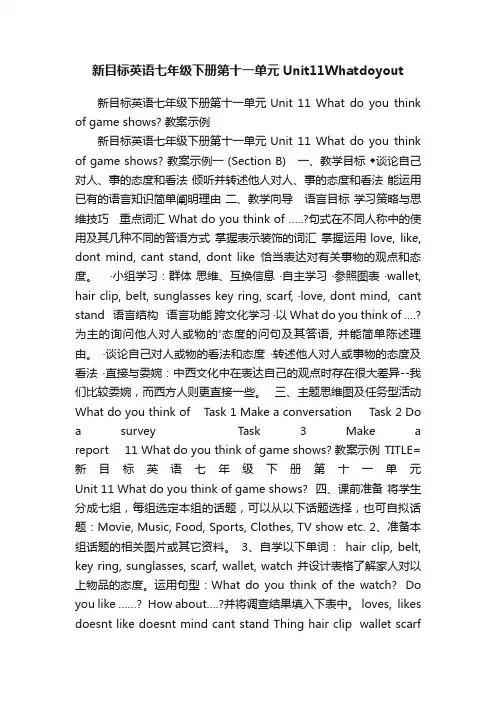
新目标英语七年级下册第十一单元Unit11Whatdoyout新目标英语七年级下册第十一单元Unit 11 What do you think of game shows? 教案示例新目标英语七年级下册第十一单元Unit 11 What do you think of game shows? 教案示例一 (Section B) 一、教学目标◆谈论自己对人、事的态度和看法倾听并转述他人对人、事的态度和看法能运用已有的语言知识简单阐明理由二、教学向导语言目标学习策略与思维技巧重点词汇What do you think of …..?句式在不同人称中的使用及其几种不同的答语方式掌握表示装饰的词汇掌握运用love, like, dont mind, cant stand, dont like恰当表达对有关事物的观点和态度。
·小组学习:群体思维、互换信息·自主学习·参照图表·wallet, hair clip, b elt, sunglasses key ring, scarf, ·love, dont mind, cant stand 语言结构语言功能跨文化学习·以What do you think of ….?为主的询问他人对人或物的'态度的问句及其答语, 并能简单陈述理由。
·谈论自己对人或物的看法和态度·转述他人对人或事物的态度及看法·直接与委婉:中西文化中在表达自己的观点时存在很大差异--我们比较委婉,而西方人则更直接一些。
三、主题思维图及任务型活动What do you think of Task 1 Make a conversation Task 2 Do a survey Task 3 Make a report 11 What do you think of game shows? 教案示例 TITLE=新目标英语七年级下册第十一单元Unit 11 What do you think of game shows? 四、课前准备将学生分成七组,每组选定本组的话题,可以从以下话题选择,也可自拟话题:Movie, Music, Food, Sports, Clothes, TV show etc. 2、准备本组话题的相关图片或其它资料。
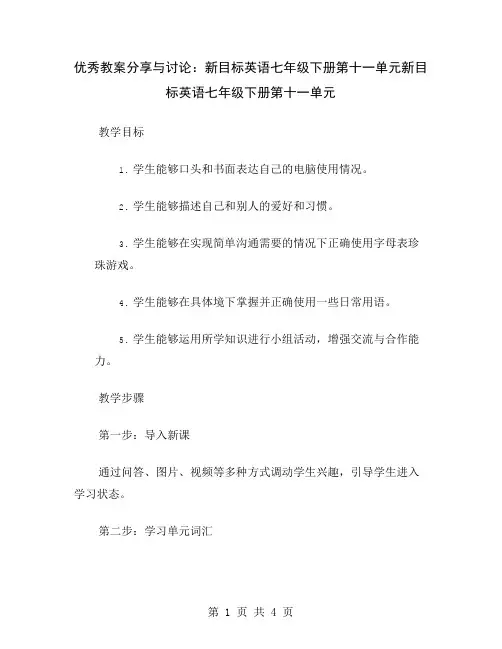
优秀教案分享与讨论:新目标英语七年级下册第十一单元新目标英语七年级下册第十一单元教学目标1.学生能够口头和书面表达自己的电脑使用情况。
2.学生能够描述自己和别人的爱好和习惯。
3.学生能够在实现简单沟通需要的情况下正确使用字母表珍珠游戏。
4.学生能够在具体境下掌握并正确使用一些日常用语。
5.学生能够运用所学知识进行小组活动,增强交流与合作能力。
教学步骤第一步:导入新课通过问答、图片、视频等多种方式调动学生兴趣,引导学生进入学习状态。
第二步:学习单元词汇教师向学生介绍单元词汇,通过多种方式让学生快速掌握单词、短语和表达。
第三步:学习语法点通过简单的语法讲解和示范,将语法知识点复习巩固。
第四步:学习珍珠游戏通过游戏的方式,让学生在良好氛围下加强字母表学习,提高字母表运用水平。
第五步:语音训练通过短语、句子的语音训练,提高学生的口语表达能力。
第六步:小组活动将学生分为小组,采用小组合作的形式,让学生在交流合作中提高语言表达和沟通能力。
第七步:课堂实践在实际语言环境中,通过小组讨论、问答等形式,让学生在情景语境中运用所学知识进行实践,加强语言输出能力。
第八步:课堂巩固通过全班讨论形式,回顾本节课所学知识点,总结评价学习效果,进一步巩固所学内容。
第九步:课后作业布置相关作业,包括听、说、读、写等多种形式,巩固所学知识。
教学重点掌握电脑用语,掌握语音语调。
教学难点正确使用字母表珍珠游戏。
教学方法听、说、读、写、游戏、合作学习等多种教学方法相结合,以渐进式、层层递进的方式教授,让学生在轻松、快乐的氛围中学习。
教学手段多媒体课件、图片、音频、视频、实物等多种教学手段,短语操练卡片、字母表珠子等教学辅助工具。
教学成果学生能够在实现简单沟通需要的情况下正确使用字母表珍珠游戏,能够口头和书面表达自己的电脑使用情况,能够描述自己和别人的爱好和习惯,能够运用所学知识进行小组活动,增强交流与合作能力。
教学反思通过本节课的教学,我认为学生在语言学习方面有了很大提高。
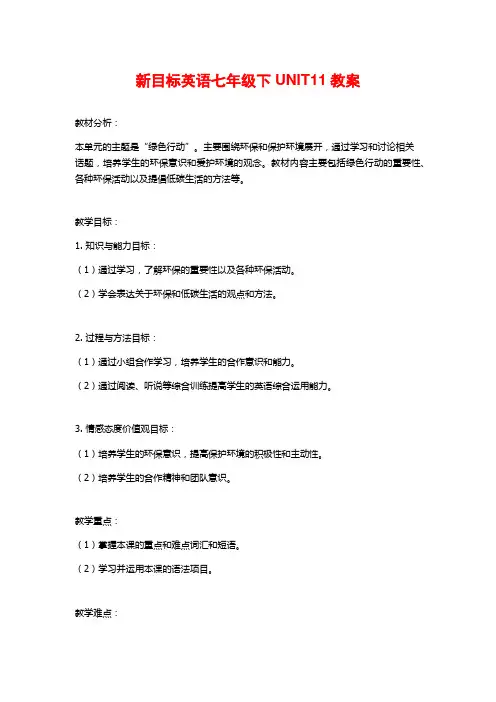
新目标英语七年级下UNIT11教案教材分析:本单元的主题是“绿色行动”。
主要围绕环保和保护环境展开,通过学习和讨论相关话题,培养学生的环保意识和爱护环境的观念。
教材内容主要包括绿色行动的重要性、各种环保活动以及提倡低碳生活的方法等。
教学目标:1. 知识与能力目标:(1)通过学习,了解环保的重要性以及各种环保活动。
(2)学会表达关于环保和低碳生活的观点和方法。
2. 过程与方法目标:(1)通过小组合作学习,培养学生的合作意识和能力。
(2)通过阅读、听说等综合训练提高学生的英语综合运用能力。
3. 情感态度价值观目标:(1)培养学生的环保意识,提高保护环境的积极性和主动性。
(2)培养学生的合作精神和团队意识。
教学重点:(1)掌握本课的重点和难点词汇和短语。
(2)学习并运用本课的语法项目。
教学难点:学会运用所学的语言知识和技能谈论环保和低碳生活的观点和方法。
教学准备:录音机、多媒体课件、图片、小组活动需要的素材以及相关课外阅读材料等。
教学讲解:Step 1. Lead-in1. Greet the students.2. Show some pictures or effects of environmental pollution and ask the students: What do you know about protecting the environment?3. Discuss with the students and make a brainstorming: What environmental problems do you know? How to solve them?Step 2. Vocabulary learning1. Assign the task to the students to read and match words with the correct pictures.2. Check the answers and let the students read the words.3. Play the recording, ask the students to listen, repeat and practice the new words.(Practice the words in sentences by writing on the blackboard.)Step 3. Grammar learning1. Show a picture of your school and ask the students: What can you see in the pictures?2. Introduce the grammar: \。
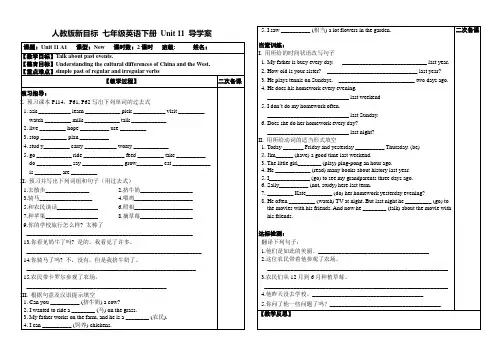
人教版新目标七年级英语下册Unit 11 导学案课题:Unit 11 A1 课型:New 课时数:2课时班级: 姓名:【教学目标】Talk about past events.【德育目标】Understanding the cultural differences of China and the West.【重点难点】simple past of regular and irregular verbs【教学过程】二次备课预习指导:I. 预习课本P114,P61, P62写出下列单词的过去式1. ask ___________ learn ____________ pick ___________ visit _________watch _________ milk ____________ talk ____________2. live _________ hope __________ use _________3. stop _________ plan __________4. stud y_________ carry ___________ worry ____________5. go ____________ ride ______________ feed _________ take __________do ____________ say ______________ grow_________ eat _____________is _________ are _________II. 预习并写出下列词组和句子(用过去式)1.去散步_______________2.挤牛奶__________________3.骑马__________________4.喂鸡____________________5.和农民谈话______________6.照相____________________7.种苹果__________________ 8.摘草莓__________________9.你的学校旅行怎么样? 太棒了_________________________________________________________13.你看见奶牛了吗? 是的。
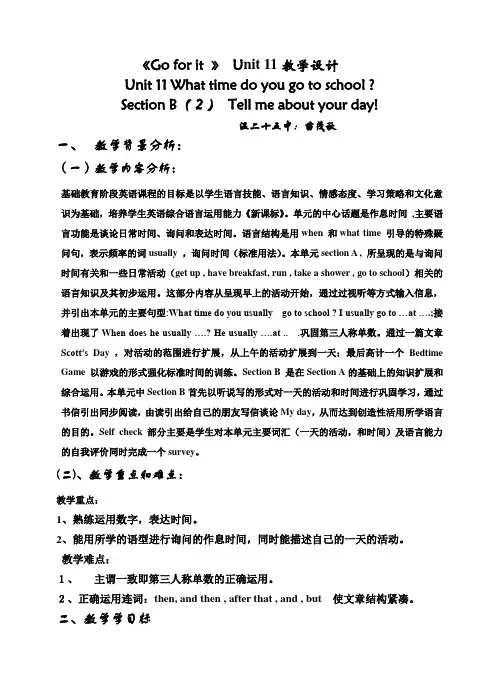
《Go for it 》U nit 11教学设计Unit 11 What time do you go to school ?Section B(2)Tell me about your day!温二十五中:苗茂秋一、教学背景分析:(一)教学内容分析:基础教育阶段英语课程的目标是以学生语言技能、语言知识、情感态度、学习策略和文化意识为基础,培养学生英语综合语言运用能力《新课标》。
单元的中心话题是作息时间,主要语言功能是谈论日常时间、询问和表达时间。
语言结构是用when 和what time 引导的特殊疑问句,表示频率的词usually ,询问时间(标准用法)。
本单元section A , 所呈现的是与询问时间有关和一些日常活动(get up , have breakfast, run , take a shower , go to school)相关的语言知识及其初步运用。
这部分内容从呈现早上的活动开始,通过过视听等方式输入信息,并引出本单元的主要句型:What time do you usually go to school ? I usually go to …at ….;接着出现了W hen does he usually ….? He usually ….at .. .巩固第三人称单数。
通过一篇文章S cott’s Day ,对活动的范围进行扩展,从上午的活动扩展到一天;最后高计一个Bedtime Game 以游戏的形式强化标准时间的训练。
Section B 是在Section A的基础上的知识扩展和综合运用。
本单元中Section B首先以听说写的形式对一天的活动和时间进行巩固学习,通过书信引出同步阅读,由读引出给自己的朋友写信谈论My day,从而达到创造性活用所学语言的目的。
Self check 部分主要是学生对本单元主要词汇(一天的活动,和时间)及语言能力的自我评价同时完成一个survey。

新目标英语七年级下册unit 11教案Unit 11 What do you think of game shows?Language goals:l In this unit students learn to give opinions to different kinds of topics and talk about likes and dislikes.New languages:l I love it. I don’t like it. I don’t mind it. I can’t stand it.l What do you think of the wallet?l He/She loves it. He/She doesn’t like it.l He/She can’t stand it.l What does he/she think of the belt?Difficult points:1. Listen for people’s opinions.2. Present Simple Tense.Teaching aids: a tape recorder some picturesPeriod1Teaching aims:1. Teach vocabulary words.2. Target Languages:What do you think of soap operas? I can’t stand them. Ilove them.3. Enable the students to give opinions and talk about likes and dislikes.4. Help the students learn how to listen to and talk about giving opinions and expressing likes and dislikes.Teaching procedures:Step 1. Warming up and lead-inPrepare some things and make sentences.Say, Hello, boys and girls. Nice to see you here again. Today we’re going to learn Unit 11. We are going to give opinions. This is a watch. What do you think of it?Ask some students to repeat the two sentences several times.Step work (la)Ask the students to read the words and the pictures, and then match the TV shows with the pictures a-e.Encourage or help the students to say sth. about the pictures and do the match work. Go on with the others in the same way. Then check the answers with the students.Step 3. Listening (1b)Ask the students to read the verbs in Activity 1b and write the number from 1a. Play the recording. Let students just listen.Then point out the blank lines where students will write numbers from 1a.Play the recording for a second time.Ask the students to listen to and read after the recording.Step 4. Pair work (1c)Ask the students to practice: What do you think of…?Show the following:What do you think of sitcoms?I love them. I can’t stand them. I don’t mind them. I don’t like them.Step 5. Homework: Ask the students to learn the new words and expressions in this unit.教后反思:这节课单词量大,学生掌握的不理想Period 2Teaching aims:1. Learn the vocabulary words and useful expressions.2. Target languages:Do you like Er Bao? How about you?3. Enable the students to give opinions and talk about likes and dislikes.4. Help the students learn how to listen to and talk about giving opinions and expressing likes and dislike.Teaching procedures:StepCheck the homework. Ask some students to work in pairs and make conversations.Then ask some students to question anything, for example, a coat and the others, give their opinions.Ask a student to point at her shoes.Ask a second student to write her opinion on the blackboard.Do more practice in oral.Step (2a, 2b)Ask the students to read the phrases in Activity ask them to listen to the conversation and write the answers on the line.Check the answers in the following way.Ask the students to listen a second time. Then check the answers and let students read the conversation and pay attention to these verbs that can give opinions.Step work (2c)Read the instructions to the class.Ask the students to read the two sentences in the students to read the conversation in Activity 2b and practice it.Ask the students to practice the conversation using the TVshow they know. Say, According to this conversation and using the TV shows you know make up a conversation. I’ll give you five minutes.Ask some pairs to practice.Step focusAsk the students to read the sentences in the grammar box and sum up the sentence structure.Say: Now read aloud the sentences in the grammar box. Then write down the sentence structure in your exercise books.Ask the student s to pay attention to the bold type words in the above form and learn the following.Step : Ask the students to do some exercises.教后反思:学生对本节课很感兴趣,积极发表自己的观点和看法。
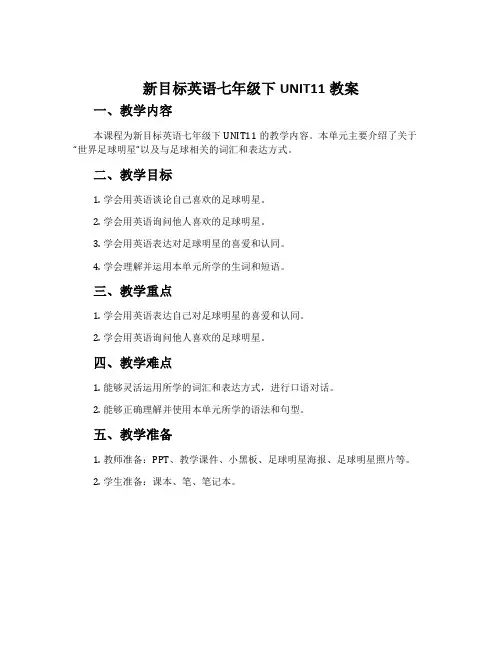
新目标英语七年级下UNIT11教案一、教学内容本课程为新目标英语七年级下UNIT11的教学内容。
本单元主要介绍了关于“世界足球明星”以及与足球相关的词汇和表达方式。
二、教学目标1.学会用英语谈论自己喜欢的足球明星。
2.学会用英语询问他人喜欢的足球明星。
3.学会用英语表达对足球明星的喜爱和认同。
4.学会理解并运用本单元所学的生词和短语。
三、教学重点1.学会用英语表达自己对足球明星的喜爱和认同。
2.学会用英语询问他人喜欢的足球明星。
四、教学难点1.能够灵活运用所学的词汇和表达方式,进行口语对话。
2.能够正确理解并使用本单元所学的语法和句型。
五、教学准备1.教师准备:PPT、教学课件、小黑板、足球明星海报、足球明星照片等。
2.学生准备:课本、笔、笔记本。
六、教学步骤1. 导入新课(5分钟)教师展示足球明星的照片或海报,并引入话题:“Do you like football? Who is your favorite football player?”教师可以先示范,然后邀请学生回答。
鼓励学生口头表达。
2. 学习新词汇(15分钟)教师通过PPT或教学课件展示本单元所学的足球相关词汇,并进行讲解和示范。
学生可以一边听讲一边进行词汇的拼写和标记。
•football(n.)- 足球•player(n.)- 球员•team(n.)- 队伍•goal(n.)- 进球•kick(v.)- 踢•game(n.)- 比赛•win(v.)- 赢•lose(v.)- 输•famous(adj.)- 著名的•favorite(n.)- 最喜欢的3. 基本句型学习(20分钟)教师通过示范和练习,引导学生掌握以下基本句型:•A: Who is your favorite football player? B: My favorite football player is [name].•A: Do you like [name]? B: Yes, I do. / No, I don’t.•A: Does he/she play in a team? B: Yes, he/she does. / No, he/she doesn’t.•A: Does he/she often win? B: Yes, he/she does. / No, he/she do esn’t.4. 听力练习(15分钟)教师播放与课文相关的录音,并配上相应的题目。
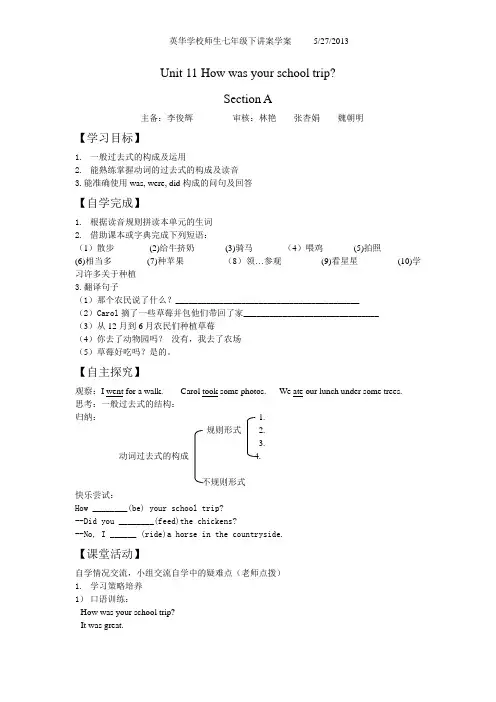
Unit 11 How was your school trip?Section A主备:李俊辉审核:林艳张杏娟魏朝明【学习目标】1.一般过去式的构成及运用2.能熟练掌握动词的过去式的构成及读音3.能准确使用was, were, did构成的问句及回答【自学完成】1.根据读音规则拼读本单元的生词2.借助课本或字典完成下列短语:(1)散步_______(2)给牛挤奶_______(3)骑马_______(4)喂鸡_______(5)拍照_______ (6)相当多________(7)种苹果_________(8)领…参观_________(9)看星星_________(10)学习许多关于种植____________3.翻译句子(1)那个农民说了什么?__________________________________________(2)Carol摘了一些草莓并包他们带回了家_______________________________(3)从12月到6月农民们种植草莓__________________________________(4)你去了动物园吗?没有,我去了农场____________________________(5)草莓好吃吗?是的。
________________________【自主探究】观察:I went for a walk. Carol took some photos. We ate our lunch under some trees.思考:一般过去式的结构:_________________________________归纳: 1.____________________规则形式 2.____________________3.___________________动词过去式的构成 4.____________________不规则形式快乐尝试:How ________(be) your school trip?--Did you ________(feed)the chickens?--No, I ______ (ride)a horse in the countryside.【课堂活动】自学情况交流,小组交流自学中的疑难点(老师点拨)1.学习策略培养1)口语训练:--How was your school trip?--It was great.--Did you see any cows?--Yes, I did. I saw quite a lot.2)阅读策略培养(2d)读对话,完成空格Eric’s trip last week was __________. He ________his grandparents _____ the countryside. Every day he _____ fishing and ______ the chickens. It was so _____ fun. The weather was ____. At night he ______ the stars. How ____ he is!3.当堂操练(3a&3b)4.成果展示给你的朋友写一封信谈论你的上一次旅行:和谁一起去的?做了什么?天气怎么样?感觉怎么样?Dear **,My school trip was ….I went to …________________________________________________ **5.当堂反馈练习1. He rode a h_______ in the park and took some photos.2. I f______ the chickens with my grandmother yesterday afternoon.3. His brother was ill. He didn’t want to eat _________ (任何东西)4. We visited our history teacher y_________.5. L________, it didn’t rain. We could play basketball on the playground.6. Our school trip was terrible.(就划线提问)___________________________7. She went to the zoo last weekend. (否定句)_________________________8. She went to the zoo last weekend. (一般疑问句)______________________【反馈小结】1.互相检查错误订正情况,教师巡视答疑2.回想本节课所学的内容,你学到了哪些?你还有什么疑问?请记录________________________________________________________________【课后延伸】写出下列动词的三单式、现在分词和过去式形式1. see_______ _________ __________2. take_________ ________ ________3. have______ ________ __________4. eat_________ ________ _________5. study_______ _________ _________6. buy_______ __________ ________7. meet________ ________ ________ 8.stop________ __________ ________9. put_______ ________ _________ 10. draw_______ _________ ________( )1.--______ there _______ elephants in the zoo? –No, there weren’t ________.A. Were, any, anyB. Was, any, someC. Are, any, someD. Were, some, any ( )2. –What did you do last Sunday? --_________________.A. I visited my grandpaB. It was greatC. I usually watch TV on SundaysD. All of the above(所有上面的)( )3. –What ____ things did you see? –I saw many actors there.A. elseB. otherC. anotherD. the otherSection B【学习目标】1.学习描述性形容词并运用他们描述好的或不好的事件2.掌握英语日记的一般格式和书写方法2.用一般过去式写日记,记叙过去发生的几件事。

七年级(下)Unit11 What do you think of game shows ?复习导学案班级姓名学习目标:1、复习并掌握本节单词及短语;2、掌握句型:What do you think of sitcoms? I love them. What does she think of sports shows? She doesn’t mind them. How about..?=What about..? Thanks for joini ng us. I can’t stand it.3.重点词组:think of, talk about, soap opera, sports show, situation comedy, game show,how about, weekend talk, a thirteen-year-old boy, hair clip, key ring, enjoy doing, thanks for doing, mind doing, show sb. sth, show sth to sb. , show sb around复习导航:重难点解析1 Mind的用法mind作“介意”“反对”讲,为及物动词或不及物动词,常用与疑问句,否定句,条件句中,其后可跟名词,代词,动名词或从句。
如I don’t mind cigarette smoke.我不在乎香烟的味儿。
I’m sure that he won’t mind.我确信他不会介意的。
Would you mind if I went home early?我早点回家你反对吗?mind作“思想”“主题”“想法”讲,为可数名词。
如Speak your mind out.把你的想法说出来。
2.how about和what about同义,用法也相同。
About是介词,后面除了名词,代词以外,还可以跟动名词或介词短语。
Unit 11 What do you think of game shows ?Section B二、Teaching aims :知识目标:1.谈论流行文化,了解各类电影和电视节目的名称。
2.了解一些日常生活用品,描述对其喜好程度。
能力目标:要求掌握以下句式:I asked students about fashion.I showed each student six things.The coolest thing was the belt.I can’t stand the idea that old people can’t be beautiful.I enjoy nice words about my good looks.情感目标:通过谈论各种流行文化、自己的喜好,学会陈述自己的看法和意见,提高学生的交际能力,逻辑表达能力及逻辑鉴别能力。
三、重难点:(1)本节课的词汇及短语:sunglasses, belt, wallet, key ring, fashion, article, idea, put, colorful. (2)句型:What do you think of … …?I can’t stand them.I don’t mind them.I love them.(3)疑问代词what 引导的特殊疑问句。
四、教学过程:1.预习导学及自测:英汉互译:(1)key ring _________ (6) the coolest thing___________(2)太阳镜__________ (7)enjoy doing ________(3)think of___________ (8)色彩艳丽的衣服________(4)… …怎么样___________ (9)欢迎到……___________(5)can’t stand_________ (10)有一个主意_____________2.情景导入:Ask students: Do you have sunglasses?Students answer: No, I don’t. /Yes, I do.Then ask students : Do you want to have sunglasses? What do you think of sunglasses? 从而引出本节课的题目:What ‘s cool? And explain what “What’s cool” means.3.自主探究:1a\1c.先将词语译为汉语,再小组做对话练习。
新目标英语七年级下册11-12单元教案新目标英语七年级下册11-12单元教案新目标英语七年级下册Unit 11: What do you think of game shows? Language goals to this unit students learn to state their opinions and talk about likes and dislikes. New language What do you think of soap operas? I dont like soap operas. What does he think of sports shows? He loves sports shows. What does she think of Maria? She likes Maria. What do they think of Tommy? They cant stand T ommy. Section A Additional materials to bring to class: a local television listing list the names of several foods on the board.For example: pizza, broccoli, ice cream, mushrooms. Next to that list, write the sentence, What do you think of ___ ? and leave a blank at the end. Ask a student the question, substituting the word pizza: What do you think of pizza? Help him or her answer / like pizza ot I dont like pizza, Point to the other foods one by one. Ask a student the question and help him or her answer J like...or I dont like.... Then point to the sentence. What do you think of ___ ? Point to a food name on the board and choose a student to ask the question: What do you think of (mushrooms)? Then point to a student to answer. Repeat the activity several times, giving several students chances to ask and answer the question. 1 a This activity introduces the key vocabulary. Focus attention on the five TVs. Say, Each TV shows different kind of TV show. In TV picture a, there is a an playing baseball. This is called a sports show. Talk about the other kinds of shows and ask students what they see. Tell the name of each kind of show as you discuss the picture. Ask students to repeat the names of the shows. Write the word sitcom on the board. Under it write the words situation comedy. Say, The wordsitcom comes from the two words situation comedy. A sitcom is a funny show. The people in sitcoms do or say things that make TV watchers laugh. Point out the numbered list of shows. Say each one again and ask students to repeat it. Then ask students to match each TV picture with one of the words. Say, Write the letter of each kind of show next to the correct word. Point out the sample answer. 1 b This activity gives students practice in understanding the target language in spoken conversation. Point to the smiley faces and the frowny faces and the words next to them. Read the words to the class or have a student do this. Say, These faces show you what the words mean. If you dont mind something, you dont either like it or dislike it. If you cant stand something, you dislike it very strongly. Your least favorite food is something you cant stand. If you love something, you like it very, very much. Your favorite food is something you love. Say, Now I will play a recording. Listen to what Mark says about the TV shows in la. Write the letter of the TV shows next to the words he uses. Play the recording the first time. Students only listen. Play the recording a second time. Point to the lettered pictures. Say, Each picture has a letter. Point out the blank spaces before the words. Say, Each word or phrase has a space in front of it. Listen to the tape and write the letter of a TV show picture in each blank. Point out the sample answer. Correct the answers. 1 c This activity provides guided oral practice using the target language. Point to the pictures of TV shows in activity la and ask students to say the name of each kind of show. Point out the example conversation. Ask two students to read it to the class. Then ask the class to point to the picture of the sitcom. Say a dialogue with a student. Have the student ask ou a question. Then answer it truthfully. Point to the ppropriate picture as you answer. Say, Nowwork with a partner. Ask and answer the qstions. Have students work in pairs. As they talk, move round the room monitoring their work. Offer anguage or pronunciation support as needed. 2a This activity provides listening practice using the target language. Call attention to the list of five words and expressions.Point out the blank in front of each one. Ask a student to read the list to the class. Say, The people on the recording are talking about TV shows. They use these words and phrases as they talk about the shows. You will number these words and phrases 1-5 in the order you hear them on the recording. Play the recording the first time. Students only listen. Point out the sample answer 1 in front of the word love. Say, The first word on the recording is love in the sentence I love it. So the answer in front o/love is number 1. Play the recording again. Ask students to write a number from 1 to 5 in front of each of the words and phrases. Check the answers. 2b This activity provides more listening practice using the target language. Point out the dialogue with blanks. Read it to the class saying blank each time you come to a blank. Say, Listen to the recording again. This time/ill in each blank with a word or phrase from the list in 2a. Play the recording. Students write words in the blanks. Check the answers. 2c This activity provides guided oral practice using the target language. Call attention to the dialogue students completed in activity 2b. Say, Read the dialogue with a partner. \ Help students find partners. Have the students practice the dialogue several times. Then say, Now talk about a TV show you both know.Tell what you like and dont like about the show and the people in it. As students work together, move around the room answering questions and offering language sup- sport as needed. Ask some pairs of students to present their dialogue!tothe class. 3a This activity provides pral and writing practice using the target language. Call attention to the list of TV shows and ask a student to read the names to the class. Say, In this activity you ask each other questions about TV shows. Ask students to work in pairs. Ask student A in each pair to look at the chart on page 67. Ask student B to look at the chart on page 86. Remind students not to look at their partners pages. Say the first question and answer with a student. Pretend you are student A and work with a student partner.Say What does Stuart think of Sports News? Have student B look at the answer on his or her chart on page 86.Student B answers, Stuart loves Sports News. Show students that you are writing in the word loves after Stuarts name on the chart on page 67. Then say to your partner, Ask me about Stuart Student B asks, What does Stuart think of Sports News? You answer, Stuart likes Sports News. Have the student write the word likes after Stuarts name on the chart on page 86. Ask the pairs to continue on their own. Move around the room monitoring the progress of the pairs. Go over the answers. 3b This activity provides guided reading practice using the target language. Read the dialogue with a student. Every time one of you conies to a blank, say blank. Call attention to the chart students completed in activity 3a. Say, Use the words in this chart to fill in the blanks in the dialogue in activity 3b. 4 This activity provides listening, speaking, and writing practice using the target language. Read the instructions to the class. Then ask students to name some TV shows they know about. Write the list on the board. Try to include some that students like and some they dont like. Point out the dialogue in the speech bubbles. Have two students read it to the class. Then point out the sample answer in the chart. Say,This TV show is called Tell it like it is! I love it, andLin Peng does, too. I write I love it under What I think and I write Lin Peng under Student who agrees with me. Say, Now go around the class. Ask students about TV shows you know. Find students who agree with you. After five minutes ask students to sit down. Then ask some students to read the information from their charts to the class. Ask students to make statements such as I dont like The Crime Files. Carlos doesnt like The Crime Files, too. Alternative: If you do not want st。
新目标英语七年级(下)Unit 11第一课时教学设计一、学生和教材分析1.学生分析1)学生年龄特点和认知特点,以及对英语学习的情感表现:初一的学生对电视节目有浓厚的兴趣,对各类电视节目有一定的了解和见解。
同时,这个年龄的大多数学生愿意表达自己对事物的看法,可以鼓励学生用正确的英语表达方式发表见解,并对学生的认识事物的观点、态度进行适当的引导。
2)学生学习本课之前已具备的语言知识和技能:掌握部分电视节目的英语表达,有一定的词汇和语法知识的积累,具备从简单听力材料中捕捉词语,短语,熟悉句型的能力。
每天课前组织做值日生报告,大胆在全班讲英语,学生敢于并能够用已学句型准连贯表达思想。
2.教材分析1)本课的教学内容选自人民教育出版社Go for it(新目标)七年级(下)Unit 11 What do you think of TV show?2)Go for it 新目标英语,实行的是新课程标准,充分发挥学生的主体地位,教师的主导作用,倡导“任务型”的教学途经,创造设计切实可行的真实的语言交际情景和任务,课堂活动要以学生的生活经验和兴趣为出发点,促使学生获取、处理和使用信息,有英语与他人交流,发展灵活运用英语解决实际问题的能力。
3)本单元重点重要的情感目标是表达喜好,形成正确的价值标准。
与七年级(上)Unit 6 Do you like bananas?和Unit 12 My favorite subject is science 有相似之处,可在教学过程中回顾以上单元的内容,由旧知识导入,由浅入深,展开新内容的学习。
4)本课主要的内容是Unit11第一课时的单词新授,句型新授,表达对事物的喜好。
教师对教材进行整合,以听说课型来教授单词与句型,提高学生在听力中捕捉信息,用已学知识表达想法见解的能力。
二. 教学方法1、采用的教学法:视听法,游戏法,任务型教学法。
主要是根据这个年级学生在视听方面有一定基础,从掌握较好的部分入手更加容易让学生掌握和理解。
Unit11 What do you think of game shows?Period 1 page 65主备人:审察人:【学习目标】Section A 1a, 1b and 1c.【学习重点】1.词汇:sitcom,soap,mind,stand2. 句型 : W hat do you think of ?你认为怎么样?/你感觉怎么样I like them. / I love them. / I don ’t like them. / I can ’t stand them. /I don ’t mind them.一、课前延伸依照汉语,写出英语。
1. 认为,想到:2.游戏节目:3. 肥皂剧,连续剧:4.体育节目:5.不能够忍受 :6.不介意 :二、课内研究(一 )自主学习1.检查课前预习作业,并教读相应的词汇。
2.看图并完成1a3.完成1c (二)合作研究(1) T : I love sitcoms. What do you think of sitcoms?S1: I love them, too. What do you think of soap operas?S2: I can ’t stand.S3:( 一个接一个地重复练习该句型)(2) Group work. ( 以小组为单位,练习上述对话)( 3)听录音并完成 1b(三)当堂达标连词成句1. soap operas,you,do,what,think,of(?)2. mind, she, doesn’t,them (.)3. can ’t, Mark, stand, boring lesson, the(.)汉翻译成英语。
1. 你认为肥皂剧怎么样?do you____ _____ ____ _____?我无法忍受。
太令人厌烦了。
I_______ ______ it. It’s too boring.2.他很喜欢数学课,很幽默。
Un it11 What do you think of game show s?Period 1 page 65【学习目标】Sec tion A 1a, 1b and 1c.【学习重点】1.词汇:sitc om,soap,mind,stand2.句型: W hat do you think of…?你认为…怎么样?/你觉得…怎么样I like them. / I love them. / I don’t like them. / I c an’t stand them. /I don’t mind them.一、课前延伸根据汉语,写出英语。
1.认为,想到:2.游戏节目:3.肥皂剧,连续剧:4.体育节目:5.不能忍受:6.不介意:二、课内探究(一)自主学习1.检查课前预习作业,并教读相应的词汇。
2.看图并完成1a3.完成1c(二)合作探究(1)T:I love sitcoms. What do you think of sitcoms?S1: I love them, too. What do you think of soap operas?S2: I c an’t stand. … S3: …… (一个接一个地重复练习该句型)(2)Group w ork.(以小组为单位,练习上述对话)(3)听录音并完成1b(三)当堂达标连词成句1. soap operas,you,do,w hat,think,of(?)2. mind , she, doesn’t, them (.)3. c an’t , Mark, stand, boring lesson, the (.) 汉翻译成英语。
1.你认为肥皂剧怎么样?do you____ _____ _________?我无法忍受。
太令人厌烦了。
I_______ ______ it. It’s too boring.2.他很喜欢数学课,很有趣。
He math c lasses. They are三、拓展提升:根据意思填空。
1. A:What you think of sitc oms?B:I them, they’re funny. How about Mary?A: She them, too.2. A: What Tim think of soap operas?B: He them, he thinks they’re boring.课后反思:Un it11 What do you think of game show s?Period 2 page 66主备人:审核人:【学习目标】Section A 2a, 2b,2c and Grammar Focus【学习重点】1.词汇及短语:king,How about,in fact2.句型: What do you think of Dumpling King?How abou t……一、课前延伸A: What do you talk shows? 你觉得访谈节目怎么样?B:我喜爱它们/ 我喜欢/ 我不介意/ 我不喜欢/ 我无法忍受I love them . / . / ./ /二、课内探究(一)自主学习(1)检查课前预习作业. (2)Group work.(以小组为单位,练习上述对话)(3) 听录音并完成2a,2b(二)合作探究:疑难点拨How about…?=what about意为……怎么样?是用来征询别人的意见,向别人提建议的交际用语,about为介词,后跟名词,代词或动名词(V-ing)How about 9 o’clock?九点钟怎么样?I’m a student. How about you? 我是一名学生,你呢?How about going swimming?去游泳怎么样?(三)当堂达标。
填空完成对话。
Jack: What do you soap operas, Mark?Mark: Idon't like.Jack: What do you think of game shows?Mark: Ilove them.Jack: What do you think of?Mark: Sitcoms?Mmm. Idon't them.Jack: about sports shows?Mark: Ithem, they’re exciting.根据汉语,写出英语。
1饺子王: 2.…怎么样: 3.实际上:三.汉翻英1 你认为游戏节目怎么样?我不能忍受它们。
2 实际上,Tom不喜欢体育节目。
3 我爱唱歌。
你怎么样?三、拓展提升:课后反思:Un it11 What do you think of game show s?Period 3 page 67主备人:审核人:【学习目标】Section A3a,3b and 4【学习重点】1.词汇:Culture, host, agree.2.短语:agree with, welcome to, thanks for doing3.句型:I do,too.一、课前延伸二、课内探究(一)自主学习: 1.检查课前预习作业。
自读3a, 3b.(二)合作探究1. 3a ask and answer in groupsE.g. A: What does Yang Lin think of English Today? B: He loves it.A:What about Alan? B: He loves it, too. = He does, too.2. 阅读3b回答问题(1) Who is the host talking to ? (2) How old is Alan?(3) What does Alan think of Sports News? (4) How does Alan like Culture China? (5) What do you think of Healthy Living?疑难点拨1.I do, too.我也是!do在这里是代动词,代替前面出现的动词,以避免重复。
口语中也可用me , too. 我也是2. Thanks for doing sth= thank you for doing sth 因……而感谢某人3.agree的用法: agree with指“同意某人或某人的意见,观点,决定,想法,安排”等,其后可以是一个名词,也可以是what引导的从句。
I don’t agree with you.我不同意你(的意见)I don’t agree with what you said.我不同意你所说的.(三)当堂达标根据汉语,写出英语。
1欢迎来到: 2.一个十一岁的女孩:3.我也是:4.赞同:用所给词的适当形式填空。
1. (welcome)to 9 o’clock Weekend Talk.2.Thank you for (join)us.3.How about (health)living.4.Do you like (watch)TV?三、拓展提升: 根据3b填空Alan is a boy. He is talking to the host. He to watch TV. He _____Sports News, but he ______Healthy Living. He ____ English Today and he Culture China. As for(至于)Chinese Cooking, he thinks cooking____ for moms. He can't it. 课后反思:Unit11 What do you think of game shows?Period 4 page 68主备人:审核人:学习目标】SectionB1a—2c【学习重点】1.词汇:sunglass, wallet, belt,2.句型: What does your father think of the watch?He doesn’t mind it.Well, I have a watch, a scarf and sunglasses.一、课前延伸写出下列短语1. 一副太阳镜________ 2 两条围巾______3 三根黑皮带________4 五块手表______5八个钱包_________ 6 九个钥匙链_____二、课内探究(一)自主学习: 自读1a, 的单词,弄清单词的意思。
(二)合作探究1:小组合作,找出1a的正确答案。
2:小组合作,谈论1a中的物品。
3:听磁带,完成2a,2b 4:小组练习展示。
(三)当堂达标汉译英1. 我有一副太阳镜。
___________________ .2 我弟弟有一块蓝色手表。
_________________.3 他妈有一条围巾和两个钱包。
_______________________.4 他喜欢这副太阳镜但不喜欢这个钥匙链。
_________________________________.根据句意及首字母提示完成单词1. The soap opera is boring. I can’t s it.2. What do you t of Sports News?3. The sun is shining brightly. Most people in the street wear s4. Whose w is this? There is some money in it.5. I s my new picture to my classmates yesterday.三、拓展提升:课后反思:Un it11 What do you think of game show s?Period 5 page 69-70主备人:审核人:【学习目标】SectionB3a—4【学习重点】1.词汇:by,fashion,said,article,put,2.短语: ask sb about sth,like and dislike,enjoy doing,put in,can you please…一、课前延伸写出下列英语短语的意义。
1. ask student about fashion2.some of their answers3. like and dislike4. the coolest thing5. enjoy reading6. put in二、课内探究(一)自主学习1. 预习下列单词,写出汉语意思:By ,fashion,said,article,put2. 朗读下列短语:ask sb about sth,问某人某事,like and dislike,enjoy doing,put in3. 阅读3a,将学生的姓名填入P87的表格中。